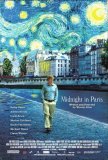Midnight in Paris (Spain/United States, 2011)
May 19, 2011
From time-to-time, I suppose we all succumb to daydreams of what it might be like to have lived during a different, perhaps simpler era. Filmmaker Woody Allen, whose cinematic recipes have often incorporated more than a pinch of nostalgia, embraces this conceit with his 2011 effort, Midnight in Paris. An odd creation by some standards, this production is neither pure drama nor true comedy. It is too light and airy to touch the emotions in more than a fleeting fashion, and its humor is gentle and low-key, rarely exhibiting the edge associated with Allen. Instead, Midnight in Paris is a fairy tale, a parfait of whimsy. The film is constructed in such a way that suspension of disbelief isn't too hard because there's something universal in what Allen explores. Like Santa Claus, we know it's not real but the idea is so appealing that we go along with the fantasy.
Gil (Owen Wilson) and Inez (Rachel McAdams) are taking a pre-wedding vacation in Paris. It doesn't take many scenes for us to become aware that, as a couple, they are mismatched. He's a simple guy who dreams of living a bohemian life. Despite being a successful Hollywood screenwriter, he yearns to move to Paris and write a novel - a notion the materialistic Inez scoffs at. One night, instead of going out dancing with his fiancé and her "pedantic" friend, Paul (Michael Sheen), Gil opts to wander the streets of Paris. Shortly after midnight, an old-time roadster pulls up alongside him and a group of party-goers motion for him to get in. He finds himself transported to another era - a between-the-wars City of Lights where he can keep company with F. Scott Fitzgerald (Tom Hiddleston), Ernest Hemmingway (Carey Stoll), Gertrude Stein (Kathy Bates), and the alluring Adriana (Marion Cotillard). Before dawn approaches, Gil finds himself returned to the modern world, but his time traveling excursions are not over.
For the most part, the story of Midnight in Paris is undemanding, especially for those who are familiar with tales of time travel (or who watch Doctor Who, which is the level of "science fiction" upon which Midnight in Paris resides). No attempt is made to explain the mechanism by which Gil wanders into his time warp - it simply happens. This is appropriate since applying any sort of reason to magic always feels forced and frequently sounds silly. Midnight in Paris is about mood, emotion, and tone. Allen frequently employs long, unbroken takes in which the roving camera makes us a fly on the wall. (These are not the shaky cam techniques that made watching some of Allen's early-'90s films difficult.) The movie's Paris is the city of post cards and romantic movies. Allen opens the film with images of many famous tourist spots as a cloudy day gives way to a rainy evening. The sequence is Midnight in Paris' most evocative.
The production fails to come up to the level of Allen's great movies, but there haven't been many of those in recent years. It's an entertaining trifle that is at least as engaging as, and perhaps more likeable than, a majority of the filmmaker's recent excursions. However, while filming in the City of Lights may have ignited Allen's visual instincts, it did not result in a superior screenplay. The dialogue lacks verve and the wit is muted. Perhaps Midnight in Paris is wish-fulfillment for Allen, and the thought of so many literary and artistic luminaries in one place results in an unusual level of respect.
Owen Wilson's Gil is Midnight in Paris' Allen stand-in. Occasionally, one can almost hear Woody speaking the lines. Gil, however, is not a neurotic, which makes for a pleasant change; this allows the character to be more sympathetic and independent that the usual protagonist in an Allen movie. Gil has two love interests. The one in the present, his fiancé Inez, is played by Rachel McAdams with all the charm of a coiled snake (or that of Katherine Heigl). Marion Cotillard's Adriana, however, is the kind of alluring muse who might make any person think of giving up television, computers, and the benefits of modern technology. Many of the secondary performers - Kathy Bates as Gertrude Stein, Adrian Brody as Salvador Dali, Carey Stoll as Ernest Hemmingway - are scene-stealers. Allen gets the best out of these actors as they step into the shoes of icons. He also gives France's First Lady, Carla Bruni, a speaking part. (She's the tour guide who translates Adriana's diary into English.)
One oddity about Midnight in Paris is Allen's insistence upon making this a true fairy tale by giving it a moral. The message, which has to do with being content in the present, isn't merely sitting in the subtext waiting to be discovered by a discerning viewer. Instead, it is broadcast with all the subtlety of a day-glo neon sign so even a dullard who sleeps through half the movie will get it. Rarely has Allen come across as so preachy.
Words like "pleasant", "enjoyable", and "undemanding" apply to Midnight in Paris, although some may consider that damning with faint praise - especially those who look to Woody Allen to cast a cynical eye on the foibles of a man in love. Allen's movies often deal with love and sex and, although he often dabbles in nostalgia, rarely does he do so with such unabashed romanticism. Midnight in Paris does not challenge greatness, but it's a nice, low-key way to spend 100 minutes.
Midnight in Paris (Spain/United States, 2011)
Cast: Owen Wilson, Rachel McAdams, Marion Cotillard, Tom Hiddleston, Carey Stoll, Kathy Bates, Michael Sheen, Adrian Brody
Screenplay: Woody Allen
Cinematography: Darius Khondji
Music:
U.S. Distributor: Sony Classics
U.S. Release Date: 2011-05-20
MPAA Rating: "PG-13" (Sexual Content, Profanity)
Genre: FANTASY/COMEDY
Subtitles: none
Theatrical Aspect Ratio: 1.85:1

Comments